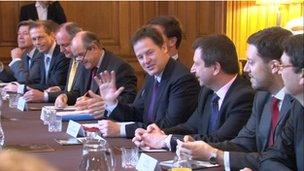Nick Clegg: Put jobs & growth before EU treaty change
- Published

Nick Clegg urges against "windowless room" debate on EU treaties
Deputy Prime Minister Nick Clegg has warned that Europe's leaders must not disappear into a "windowless room" to debate institutional changes.
Instead they should focus on promoting jobs and growth, he said during a press conference with the Dutch PM.
David Cameron said on Monday it was time for the UK to "refashion" its relationship with the EU.
The prime minister argued powers should "ebb back" from Brussels to Westminster as part of "fundamental" future reform.
But speaking at a press conference alongside Dutch prime minister, Mark Rutte, Mr Clegg said only populists and demagogues would benefit if EU leaders disappeared "into a windowless room" to discuss things that no-one understood, at a time when people were worried about their jobs.
He said the debate had become polarised between those rushing to negotiate new treaties and those wanting to unravel the whole thing - neither side had their priorities right he said.
Mr Clegg, whose party is the most pro-European of three largest UK parties, described himself as a pro-European who believed in reform.
He said he had campaigned for changes to the Common Agricultural Policy, the Common Fisheries Policy and opposed the recent idea of a financial transaction tax.
The Dutch prime minister agreed that too much institutional debate "is taking energy away from what should be our main focus, which is to get growth going".
"Europe first of all should be about free trade, more jobs, more prosperity, more growth," said Mr Rutte.
"It may be a treaty change is necessary. If so, then we have to debate it and it should be very limited and it should take as little time away from the main debate on jobs and growth as possible."
In a speech on Monday Mr Cameron referred to himself as one of the "sceptics".
"Change brings opportunities," Mr Cameron said in his City of London speech, "an opportunity to begin to refashion the EU so it better serves this nation's interests and the interests of its other 26 nations.
"An opportunity, in Britain's case, for powers to ebb back instead of flow away and for the European Union to focus on what really matters to underpin prosperity, stability and growth.
"That is the kind of fundamental reform I yearn for."
- Published15 November 2011
- Published14 November 2011